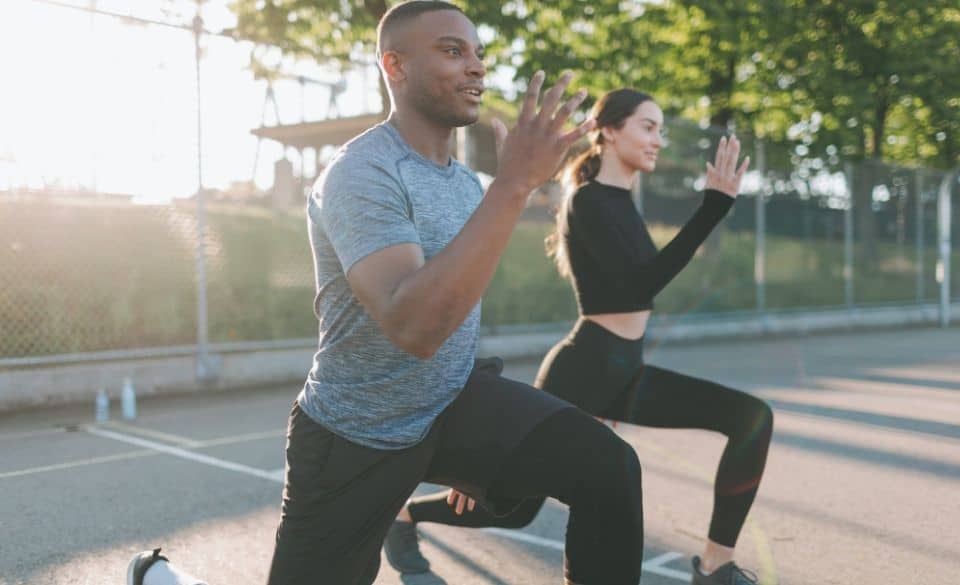
What Causes Tingling In The Legs After Exercise?
Page Contents
The tingling sensation you feel when warming up before exercise is one thing. However, if you experience tingling in the legs after exercising can be a whole different story. Luckily, even though it may be concerning to some people, it’s not always a bad sign.
Thousands of runners and gym enthusiasts everyday experience a tingling sensation after exercise, but what causes tingling in the legs after exercise?
Unfortunately, there are many causes. Injuries, nutrition, hydrating, and clothing can all be a cause in some way or another.
This article focuses on the causes and symptoms of tingling in the legs. We also discuss whether this is a cause for concern or not. If you are a runner, gym enthusiast, or athlete that suffers from this, keep reading, as this article may help you find the cause and prevent it from happening in the future.

What Is Tingling In Legs A Symptom of?
Long-term tingling of the legs is often a result of conditions like multiple sclerosis (MS), diabetes, peripheral artery disease, or fibromyalgia. the tingling sensations are often felt in the whole leg, feet, or just below the knee.
If you only experience tingling in the legs after exercise, don’t be worried. This is usually a non-serious issue and shouldn’t be a cause for alarm if it happens periodically. However, if it happens after exercising all the time, you may need to speak with a doctor, as they can help diagnose the cause of the tingling.
After exercising, tingling of the legs is a symptom of either:
– Low electrolyte levels
– Pinched nerves
– Injury to the back during a workout
– Chronic Exertional Compartment Syndrome
– Entrapment Syndrome
Most of the time, tingling in the legs after exercise should subside within a few minutes of rest. The most common cause of tingling in the legs comes from depleted nutrients in the muscles, which is caused by a lack of hydration and/or electrolyte imbalance.
If the tingling doesn’t bother you, you can continue on with your day. This will help the blood flow leave the muscles, to other parts of your body and most of the tingling will stop after a short period.
What Causes Tingling In The Legs After Exercise?
Most people that experience tingling in the legs after exercise hasn’t hydrated properly during their workout. This is generally more common in runners or cyclists than gym enthusiasts.
Electrolytes like sodium, potassium, calcium, and magnesium are important for nerve and muscle function. If these are depleted during a workout, you may find it affects the way the muscles contract and relax. If the levels of sodium, calcium, and potassium decline also, it will affect how your muscles contract which may cause the tingling feeling in the legs post-workout.
More serious cases of tingling after exercise may be caused by a pinched nerve. A pinched nerve can occur in different areas of the body. When a nerve is pinched, it is caused by too much pressure on the nerve from surrounding tissues, bones, cartilage, and tendons. the added pressure on the nerve can then cause tingling, numbness, and even pain.
Alternatively, another common cause of tingling in the legs is an injury to your lower spine (sacroiliac (SI) joint). This is usually caused by an unexpected movement, fall, or even uneven terrain while running. When the sacroiliac joint is affected by this, it can cause tingling down one side of the leg.
A herniated disc can also cause tingling. However, this is usually a more serious case and should be referred to a physiotherapist.
Tingling In Legs After Exercise – What Should You Know?
Most of the time, tingling in the legs after exercise will stop after a few minutes of rest. However, during this time it is important to rehydrate and get adequate electrolytes back into the body. By doing this you can help the tingling resolve much quicker.
Alternatively, regular massages and healthy eating will help the body repair itself faster after exercise, leading to a better contraction of the muscles after exercise.
If the tingling doesn’t subside after 30 minutes and happens regularly, speak to a doctor or physiotherapist. You may have a pinched nerve, or something more serious.
Also make sure your shoes aren’t tied too tight, as this is a common mistake by runners and gym enthusiasts. Alternatively, if you aren’t dealing with anything serious, book an appointment with a nutritionist, as they can help you with your diet, to make sure you are getting enough nutrients and electrolytes before, during, and after exercise.
Keeping a diary can also help you find the cause. Does it appear after a workout? Does it appear during a workout? Does it happen when wearing a certain piece of clothing or shoes?
All these answers can help you find the cause of the tingling if you don’t suffer from any of the causes in this article.
You may find that some of the clothing you wear can be cutting off blood flow (compression clothing) or your shoes may be rubbing on a nerve or similar.
Usually, there is nothing to worry about and you should be able to continue exercising the following day and carry on your day as normal. However, like anything, it is better to check there are no underlying issues that cause the tingling sensations after training.



